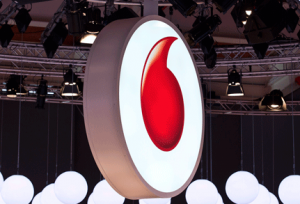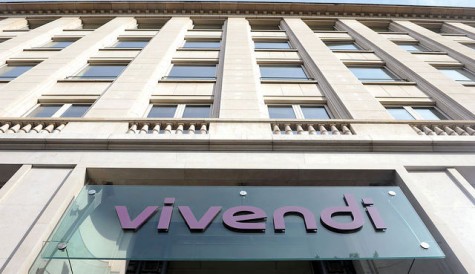Vodafone’s German TV base plummets, but CEO sees broadband opportunity from change in TV law
 Vodafone’s TV base in Germany declined by a staggering 120,000 subscribers in the company’s fiscal first quarter ahead of changes to German TV laws that could see it fall further.
Vodafone’s TV base in Germany declined by a staggering 120,000 subscribers in the company’s fiscal first quarter ahead of changes to German TV laws that could see it fall further.
However, CEO Margherita Della Valle says she believes the company has an opportunity to up its share of broadband in the MDU market as the new rules come into force.
Vodafone said that its consumer converged customer base in Germany remained broadly stable at 2.3 million.
TV numbers in Germany now stand at 12.64 million, down from 12.76 million last quarter.
Vodafone stands to lose high-margin revenue in in its fiscal second half, alongside losing more German TV customers, as rules that prevent housing associations from bundling TV with rental costs come into force.
Speaking to analysts, Della Valle said that the €800 million in revenue likely to be lost from the change in TV law had a high margin of 80-90%, meaning there will be an impact on the bottom line. However, she said that there was no immediate connection between losing a TV customer and losing broadband customers, because TV was billed with the rental cost, while broadband was billed direct from Vodafone.
She admitted that Vodafone’s competitors would market heavily to secure higher broadband share while the change was going on, but said she saw this as “also as an opportunity for Vodafone to increase its broadband penetration” as it would have to engage in intensive marketing to manage the TV transition.
Della Valle said that penetration of broadband in the MDUs currently stood only in “the low 30s” so there was a great opportunity to improve this.
On whether Vodafone could retain TV customers in the MDU market, she said that big housing associations tend to change contracts in January, meaning that trials of managing transitions had been limited to date. She said in one trial Vodafone had secured 65% penetration of its previous base. A second larger trial had delivered lower penetration in its initial phase, she said, noting this had increased more recently but not to the 65% level.
Della Valle said that a third smaller trial using different marketing techniques had delivered over 60%.
She said the company would continue to refine its approach.
Della Valle said that Vodafone was currently focused on optimising pricing to drive up revenue, rather than subscriber numbers, particularly in view of the inflationary pressures the company is under.
Addressing German broadband, she said the numbers had been hit by the impact of a €5 price hike. This price change had now been notified to 50% of the customer base, with more to follow. However, she said the churn impact had been relatively low.
Della Valle said she expected improvement in broadband subscriber numbers in general in the second half.
She said that while service revenue would be hit by the change in housing association TV rules in Germany, this would be countered by improvements elsewhere, including business revenues, changes to its commercial model and the ongoing price changes.
Need for ‘structural change’ in Spain
In Spain, Vodafone’s other main TV market, where it has also been struggling, service revenue declined by 3% due to a lower customer base and continued price competition in the Consumer value segment, partially offset by price increases. The sequential improvement in trends reflects a full quarter benefit from price increases implemented in Q4.
The Spanish broadband base declined by 65,000, and its mobile contract base fell by 87,000. The TV base in Spain fell by 33,000 to 1.426 million.
Della Valle said “structural change” was very much necessary in Spain in the context of market conditions. She said the company was “considering a range of options” but it was too early to comment on these.
The company is meanwhile revamping its commercial approach in Spain, cutting stores and dealer networks.
TV numbers in other markets also fell. In Italy, Vodafone’s TV base declined by 13,000 to 235,000. The one bright spot was Portugal, where the company’s TV base increased by 9,000 to 861,000.
Improved revenue performance
Despite the drops in TV numbers, the telecom giant reported improved revenue performance driven by higher prices and an uptick across Germany, Italy and Spain overall.
Revenues fell by 4.2%, due to the sale of Vodafone’s busineses in Ghana (to Telecel) and Hungary (to 4iG), but grew by 3.7% organically, to €9.11 billion, with Germany accounting for €2.819 billion.
In Germany, revenue losses slowed down thanks to price rises despite the loss in subs.
Fixed service revenue declined by 0.9% compared with 2.1% in the quarter to March, driven by a lower broadband and TV customer base, partially offset by higher broadband ARPU. During Q1, Vodafone began the phased implementation of a broadband price increase across its customer base. This supported service revenues but impacted the subscriber count, with net cable customer disconnections of 70,000 and 51,000 DSL losses.
Vodafone also announced that it had hired former SAP chief financial officer Luka Mucic to take on the finance role at Vodafone, replacing Della Valle in that role, which she has combined with the chief executive post since taking over.
“As we progress our plans to transform Vodafone,we have achieved a better service revenue performance across almost all of our markets. We have delivered particularly strong trading in our business segment and returned to service revenue growth in Europe. Looking ahead, we have taken the first steps of our action plan focused on customers, simplicity and growth, but we have much more still to do,” said Della Valle.




